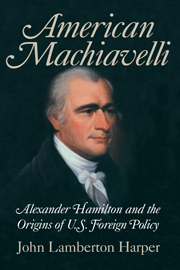Book contents
- Frontmatter
- Contents
- List of Illustrations
- Acknowledgments
- Miscellaneous Frontmatter
- Introduction
- PART I THE COMING OF NECESSITY
- PART II BATTLE LINES ARE DRAWN
- 3 At Washington’s Side Again, 1789
- 4 Hamilton versus the Virginians, 1789–1791
- 5 The Nootka Sound Crisis, Part One: The Morris Mission
- 6 Nootka Sound, Part Two: The View from New York
- 7 Liaisons Dangereuses, 1791–1792
- PART III SEIZING THE HELM
- PART IV INFORMAL ADVISER TO THE PRINCE
- PART V A PRINCE IN HIS OWN RIGHT?
- PART VI THE LESSER OF EVILS
- Conclusion: Hamilton Then and Now
- Notes
- Bibliography
- Index
7 - Liaisons Dangereuses, 1791–1792
Published online by Cambridge University Press: 05 April 2013
- Frontmatter
- Contents
- List of Illustrations
- Acknowledgments
- Miscellaneous Frontmatter
- Introduction
- PART I THE COMING OF NECESSITY
- PART II BATTLE LINES ARE DRAWN
- 3 At Washington’s Side Again, 1789
- 4 Hamilton versus the Virginians, 1789–1791
- 5 The Nootka Sound Crisis, Part One: The Morris Mission
- 6 Nootka Sound, Part Two: The View from New York
- 7 Liaisons Dangereuses, 1791–1792
- PART III SEIZING THE HELM
- PART IV INFORMAL ADVISER TO THE PRINCE
- PART V A PRINCE IN HIS OWN RIGHT?
- PART VI THE LESSER OF EVILS
- Conclusion: Hamilton Then and Now
- Notes
- Bibliography
- Index
Summary
Introduction
Machiavelli devoted Chapter 6 of The Prince to the subject of parvenus who acquire the state thanks to their own arms and virtù. In it, he warned “that there is nothing more difficult to execute, nor more doubtful of success, nor more dangerous to manage, than to introduce new orders; because the innovator has as enemies all those who benefit from the old orders, and has only lukewarm support from those who would do well from the new orders.” The establishment of the Bank of the United States in early 1791 was Hamilton’s crowning victory in the domestic arena. He was now the virtual prime minister of Washington’s government and the toast of Philadelphia high society. But as Machiavelli might have predicted, his ambitious program was simultaneously undermined by the passionate opposition of the partisans of a more traditional order and the shortsighted behavior of those he had considered his natural collaborators.
The latter included investors like William Duer, former assistant secretary of the Treasury, whom Hamilton had counted on to spearhead the development of the American economy. Instead they borrowed large sums and generated a speculative frenzy in Bank stock and government securities. When the bubble burst in August 1791, the Treasury was forced to buy government paper to support the price. Hamilton warned Duer, “If the infatuation had continued progressive & any extensive mischiefs had ensued you would certainly have had a large portion of the blame.” Around the same time, another New York friend, Robert Troup, wrote that there had been “every appearance of a passionate courtship between the Chancellor [Robert R. Livingston], Burr, Jefferson & Madison when the latter two were in Town.” Troup warned Hamilton, “Delenda est Carthago [Carthage must be destroyed] I suppose is the Maxim adopted with respect to you.”
- Type
- Chapter
- Information
- American MachiavelliAlexander Hamilton and the Origins of U.S. Foreign Policy, pp. 88 - 100Publisher: Cambridge University PressPrint publication year: 2004



